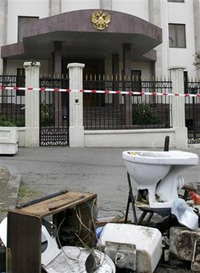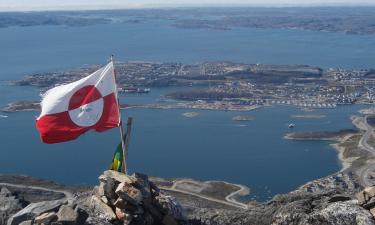Russia officially closes its embassy in Georgia and recalls ambassador
The Russian ambassador to Georgia and a group of Russian diplomats left the country yesterday on September 30. The plane with the European Union foreign policy chief, Javier Solana, landed at the airport of Tbilisi in less than an hour.

Russia’s ambassador to Georgia, Vyacheslav Kovalenko, and 20 officers of the diplomatic mission and their family members embarked an Il-62 jetliner to return home due to the termination of diplomatic relations between Russia and Georgia. Georgia cut its diplomatic relations with Russia on Septmeber 2 and offered to keep consular links. Tbilisi left its consul and two vice consuls in Moscow.
Russian diplomats told the Vremya Novostei newspaper that there will be six consular officers and technical personnel left in Georgia’s capital.
Georgian officials were not seeing the Russian ambassador off on the day of his departure from Tbilisi . A few of those supporting the restoration of diplomatic relations with Russia came to say goodbye to their former colleagues. One woman brought a bouquet of flowers.
European Union monitors began patrolling Georgian territory Wednesday under a French-brokered peace deal, and Russian troops allowed some monitors into a buffer zone around South Ossetia despite insisting earlier they would be blocked.
A Russian peacekeeping statement Tuesday saying monitors would not be allowed on Georgian territory around the separatist region of South Ossetia had raised concern that Moscow was stalling on withdrawing its troops from Georgia as it promised to do after its August war with Georgia.
But when EU observers arrived Wednesday at Russian checkpoints near the Georgian villages of Karaleti and Kvenatkotsa, at the perimeter of Russia's so-called "security zone" on Georgian territory, Russians quickly let them move into the area.
The Russian soldiers didn't allow reporters to follow the observers into the buffer zone near Kvenatkotsa, but let Georgian civilians pass after examining their vehicles.
"The situation is very calm," Ivan Kukushkin, a Russian officer in charge of the checkpoint said with a smile.
EU mission head Hansjoerg Haber told reporters the Russian military had earlier warned the EU monitors from entering the buffer zone, citing concerns for their security.
"We received different signals," Haber told reporters. "We want to clarify these differences in the coming hours."
Another group of EU monitors visited the village of Odisi in a different sector just outside South Ossetia.
Russia and Georgia agreed to the EU observer mission as part of an updated cease-fire plan following the war, which ended with Russian and separatist forces in control of the breakaway regions of South Ossetia and Abkhazia and dug in on other territory in Georgia.
As part of the deal, Moscow agreed to withdraw its forces completely from areas outside of South Ossetia and Abkhazia within 10 days of the EU monitors' deployment Wednesday — including from a roughly 4-mile (7-kilometer) buffer zone they have created southward from South Ossetia.
"The Russians gave us plans for dismantling their (check)points but didn't say when," Haber told reporters.
At the Russian checkpoint near the Georgian village of Kvenatkotsa, an armored personnel carrier was parked up the hill near camouflaged tents and there was no sign of any preparations for a Russian troop pullback.
Russia still plans to keep around 7,600 troops in South Ossetia and Abkhazia, and has refused to allow EU monitors inside the regions themselves.
"Show the flag, be friendly, show confidence," Haber told monitors in Basaleti, about 12 miles (20 kilometers) north of the Georgian capital, Tbilisi.
Some 300 EU observers will be based in four semi-permanent locations, including the central city of Gori near South Ossetia and the Black Sea port of Poti, key targets of Russian forces.
In Gori, another group of EU monitors boarded their light armored vehicles to head toward the buffer zone outside South Ossetia.
One observer, Adam Glinsky, a 43-year old Polish policeman, downplayed Russia's warning not to enter the buffer zone. "It's only yesterday's opinion, hopefully tomorrow it will be different," he said.
EU foreign policy chief Javier Solana, who visited Georgia on Tuesday, expressed optimism that Moscow would pull its troops back in the promised time frame.
"I am optimistic that all parties will comply with the agreement that was signed," Solana said. "We hope very much and we are sure that before Oct. 10 that part of the mission will be completed."
Georgian President Mikhail Saakashvili skirted questions about EU access at a news conference Tuesday. He stressed that Georgia wants a complete Russian withdrawal.
"We will not be happy until the last Russian soldier gets out of my country," he told a news conference with Solana.
Subscribe to Pravda.Ru Telegram channel, Facebook, RSS!





